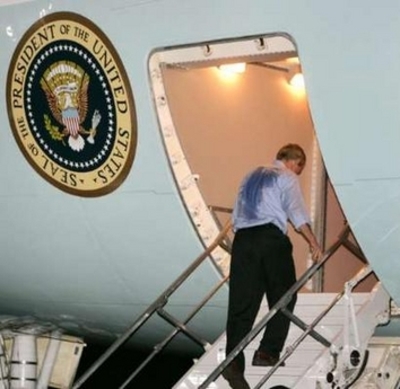
Hat tip: Shakespeare’s Sister
REACTIONS FROM OTHERS:
Balz/Washington Post: The main text of President Bush’s nationally televised address last night was the rebuilding of New Orleans and the Gulf Coast, but the clear subtext was the rebuilding of a presidency that is now at its lowest point ever, confronted by huge and simultaneous challenges at home and abroad — and facing a country divided along partisan and racial lines.
Krugman/ NY Times: But George W. Bush isn’t F.D.R. Indeed, in crucial respects he’s the anti-F.D.R. President Bush subscribes to a political philosophy that opposes government activism – that’s why he has tried to downsize and privatize programs wherever he can. (He still hopes to privatize Social Security, F.D.R.’s biggest legacy.) So even his policy failures don’t bother his strongest supporters: many conservatives view the inept response to Katrina as a vindication of their lack of faith in government, rather than as a reason to reconsider their faith in Mr. Bush.
The Moderate Voice/Michael Stickings: Personally, I didn’t think much of it. I don’t doubt his compassion, and he may have said the right things ("there is no way to imagine America without New Orleans"), but I can’t get past his obvious incompetence and the utter lack of leadership he showed after Katrina hit the Gulf Coast. . . . . David Kusnet, former Clinton speechwriter, liked Bush’s speech. As a speech, not necessarily for the content (though he liked much of that, too): "Never before has a president spoken so well and acted so ineptly. Perhaps the rhetoric will win Bush a second chance." I just don’t think he spoke that well, though the rhetoric may indeed give him "a second chance".
Conservative "Christian" La Shawn Barber in "Bush the Sugar Daddy": What Bush proposes is not an improvement; it’s just a lateral, welfare-dependent move to different cities and states. It’s certainly not his job to vanquish poverty. That’s the job of individuals. But an honest speech would’ve acknowledged that government dependency does not improve lives. Part of the reason so many were stranded in the storm without food and water in the first place is because they were too dependent on the government for subsistence. Why couldn’t he say that?
The Next Hurrah/DemFromCt: This most partisan President who has poisoned the well has no reservoir of good will left. He has governed his entire Presidency by forcing his way into the WH (no, we have not gotten over 2000 – it matters). He has forced Democrats who supported his major initiatives out of office (see Max Cleland 2002) and replaced bipartisanship with crony-directed Republicans only policy (see Texas residtricting). He has played to the base so often that no one outside the base thinks it’s normal, or usual, or even expected to support him. Well, he’s got what he’s created… George W Bush is President of the United 40%, and even they aren’t so united any more. Bush’s speech was not especially well received… it reaches his low bar of beign better than anything else he’s said on the topic, but there’s a whiff of desperation to the theatrics and visualos. He came across as hermetically sealed in his beauty shop, clueless and out of touch. In other words, it was far more revealing than it was meant to be, and jarring compared to the real NOLA situation.
Military Analyst William Arkin/WaPo: Amidst all of President Bush’s proposals last night was one decree that the Commander-in-Chief can implement without Congressional or public intervention: "It is now clear that a challenge on this scale requires greater federal authority and a broader role for the armed forces — the institution of our government most capable of massive logistical operations on a moment’s notice."… I for one don’t want to live in a society where "a moment’s notice" justifies military action that either preempts or usurps civil authority. … What is more, nothing about what happened in New Orleans justifies such a radical move to give the military what bureaucrats call "a lead role" in responding to emergencies. … In the wake of Katrina, the military was standing by awaiting orders, as it should be. The White House and the federal government were for their part either on vacation or out to lunch. The problem wasn’t the lack of resources available. It was leadership, decisiveness, foresight. The problem was commanding and mobilizing the resources, civil and military.
Howard Kurtz/WaPo: Well, the choreography was pretty impressive.
